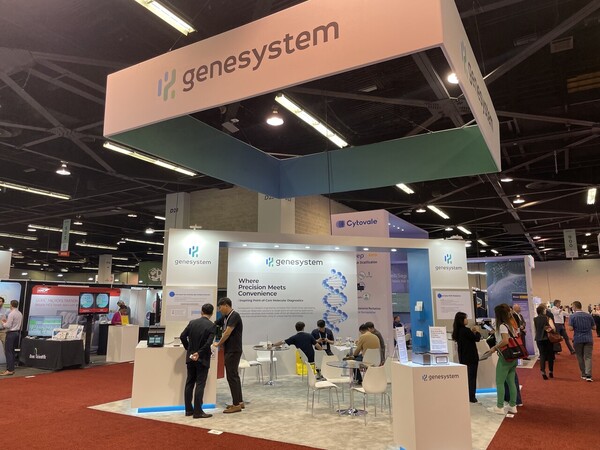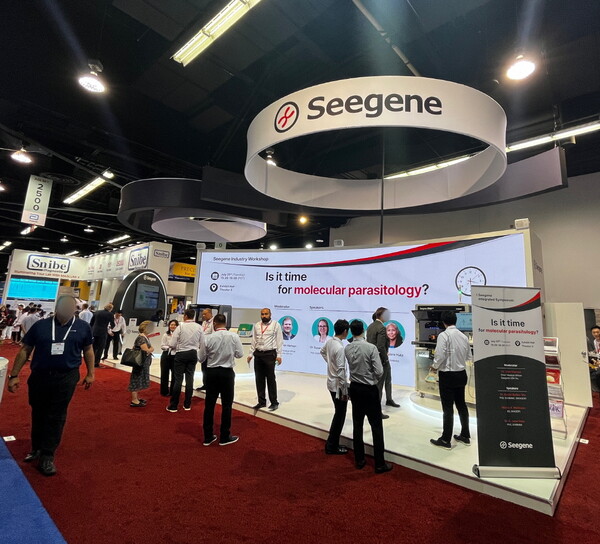
Many Korean diagnostic companies participated in the "2023 American Association for Clinical Chemistry (AACC) Expo" held in Anaheim, Calif., from July 25 to 27 (local time) to showcase their new products and technologies.
AACC, which marked its 74th year, is the world's largest conference and exposition for the diagnostic testing industry, showcasing the latest clinical chemistry research and global diagnostic testing technology trends. The group changed its name to the Association for Diagnostics & Laboratory Medicine (ADLM) this year to encompass a broader range of diagnostic fields.
Nine-hundred-and-forty-three firms from about 100 countries participated in the exhibition, and more than 27,500 people, including specialists, attended it.
More than 40 Korean companies also took part in the event.
For instance, EzDiatech, an in vitro diagnostics company, introduced the VEUPLEX TBI assay, a blood-based concussion test kit. VEUPLEX TBI assay is a diagnostic cartridge that can simultaneously test two specific biomarkers to detect traumatic brain injury in a patient's blood. In March, the Ministry of Food and Drug Safety designated it as an innovative medical device.
EzDiatech also made a poster presentation, "A Versatile Immunoassay Platform for Fast Multiplex Detection of Protein Biomarkers Based on A Nobel Magnetic Particle System, explaining the technology related to VEUPLEX TBI assay.
"Through the AACC exhibition, we have identified many potential customers who can serve as a bridgehead for our strategy to enter the North American continent," CEO Cheong Yong-kyun said. "With this in mind, we plan to present a bigger vision and gain an edge in the global market through our next-generation diagnostic business strategy."

Seegene, a PCR molecular diagnostics company, has unveiled a new syndromic quantitative PCR product and a fully automated molecular diagnostic test system, AIOS (All-in-One System). The syndromic quantitative PCR technology is a real-time PCR-based simultaneous multiplex molecular diagnostic technology that can identify the exact causative agent by testing multiple pathogens that cause similar symptoms in one tube.
"Seegene introduced its flagship Allplex and Novaplex product portfolios under the concept of 'All Tests with One System' and proposed a region-customized integrated test system that can be applied to all of its products," a Seegene official said. "These were well received by in vitro diagnostics experts and partners worldwide."
GeneSystem introduced a point-of-care test (POCT) product developed with its technology. The product included UF-300, which enables real-time molecular diagnosis, UF-340, which enables multi-diagnosis at once, and a newly introduced nucleic acid extractor. GeneSystem recently signed an order to supply POCT products to the Indian market.
"With the rapid rise of prevention in the global healthcare market after the Covid-19 pandemic, there is an increasing demand for diagnostic technologies and products that can quickly and accurately diagnose various infectious diseases at the medical site and a realistic test cost," a GeneSystem official said.
Suzentech introduced its diagnostic platform, including the home test-based Surearly SMART. Surearly SMART measures five female hormones related to pregnancy, ovulation, and menarche, including estrogen and progesterone, and provides a mobile app for women to check pregnancy status, manage the risk of ectopic pregnancy, miscarriage, and transition to menarche, and continuously manage their hormonal patterns.
"At this event, we will actively promote our core technology and more advanced diagnostic products and accelerate our entry into the U.S., the world's largest market, with our Surearly SMART products targeting the rapidly growing femtech market globally," a Suzentech official said.
SML Genetree, a molecular diagnostics company of Samkwang Biotree Group, participated in the event with its sister company, Samkwang Medical Foundation, and exhibited its new product lines, including GI (gastrointestinal infection) panels, CMV, and BKV. SML Genetree established a U.S. subsidiary in 2020 to accelerate its entry into the U.S. and Latin American markets. The company also plans to strengthen partnerships with key distributors in Latin America.
Korean diagnostic testing organizations were also present at the event. Kim Young-jin, president of Seoul Clinical Laboratories (SCL) 's Human Derivatives Bank, was awarded the Best Poster Award. GC Labs did not participate in the event, but Lee Eun-hee, chairperson of the foundation, attended the event.
The Korea Health Industry Development Institute (KHIDI) operated a PR booth, holding a U.S. healthcare IR event. It also organized a conference in which five Korean companies -- Seegene, ProteomeTech, PCL, Bioneer, and Rapigen -- presented their product clinical evaluation results.
PCL CEO Kim So-youn presented "Efficient Multiplex TTiD Management in the Era of Pandemics."
"It was an opportunity to strengthen cooperation with Chinese buyers, including technology transfer and product export, based on PCL's unique technology," Kim said. "We also had important meetings with buyers to expand into the Middle East and Africa, and it became a bridgehead to enter the North American market."
Lee Ji-hoon, a professor at the Department of Diagnostic Laboratory Medicine at the Catholic University of Korea Eunpyeong St. Mary's Hospital, who attended the event, said, "With the name change, the scale of the exhibition grew far larger, including not only clinical chemistry but other all other diagnostic departments."
However, the event also reaffirmed the challenges facing Korean diagnostic companies.
"Korean in vitro diagnostic medical device makers were unprepared for the market after the Covid-19 pandemic eased into an endemic and faced various challenges, including inventory issues. In contrast, Chinese companies are growing in the global market, capitalizing on their strengths in materials, parts, and equipment based on the Chinese domestic market," an industry insider said.
The observer added that this year's AACC was a place where one could see the slump of Korean companies and the emergence of their Chinese competitors.

